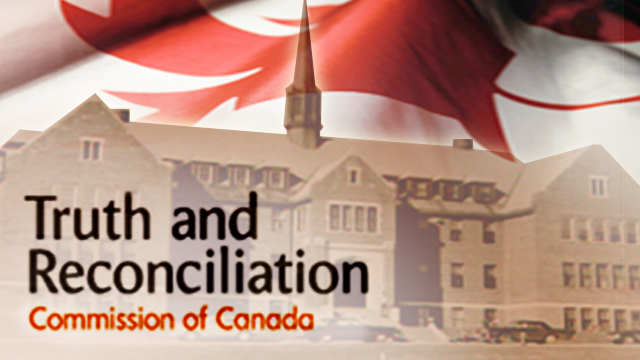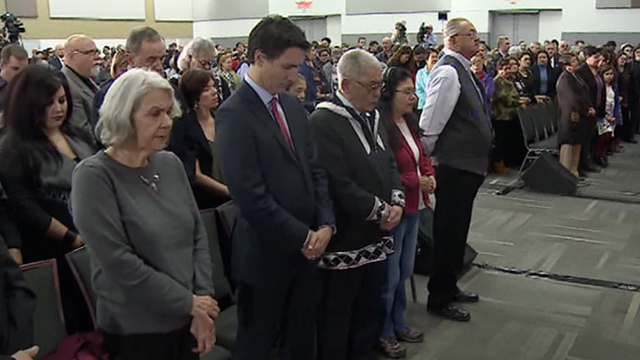

A new analysis reveals “dreadful progress” has been made on the 94 Calls to Action issued by the Truth and Reconciliation Commission (TRC) of Canada in December 2015.
Academics Eva Jewell and Ian Mosby co-authored a 2019 status update released by the Yellowhead Institute at Toronto’s Ryerson University Tuesday.
“We found that in the first year there was about five calls to action that were completed,” Jewell said in a telephone interview. “And since 2016… only four more have been completed.
“That gives us an average of about 2.25 calls to action being completed per year, which is dreadful progress.”
It’s a disappointing result, added Jewell, particularly after the calls were unveiled with much fanfare as part of the TRC’s final report.
At this rate, “it will be 2057 by the time all the calls are completed,” she said.
Watch Ian Mosby discuss the Yellowhead Institute’s findings:
Prime Minister Justin Trudeau embraced the calls at the 2015 unveiling, describing them as a blueprint to reconciliation with Indigenous peoples.
He promised to meet the ones that applied to the federal government, including implementing the United Nations Declaration on the Rights of Indigenous Peoples (UNDRIP).
In 2016, his government adopted UNDRIP and has still not implemented it.
In their update, Jewell and Mosby found only nine calls had been met so far – five by the federal government.
1) Federal acknowledgement of Indigenous language rights;
2) A federal Missing and murdered Indigenous women’s and girls inquiry;
3) Federal support for the National Centre for Truth and Reconciliation;
4) Long-term support from all levels of government for North American Indigenous Games;
5) Federal support for Indigenous sport programs and athletes;
The other four are; Adoption of UNDRIP by churches and faith groups, rejection of the Doctrine of Discovery by churches and faith groups, reconciliation agenda for the Canada Council for the Arts and reconciliation agenda for the Aboriginal Peoples Television Network (APTN).
Jewell called the federal government’s efforts “cosmetic changes.”
‘Tools of reconciliation’
But in 2015, the former chair of the TRC and now Senator Murray Sinclair cautioned that change would not be immediate. He suggested it would “take generations” to “create tools of reconciliation.”
Sinclair could not be reached for comment for this story.
Jewell and Mosby found governments, educational and religious institutions, and some professional organizations were making progress.
But not enough “systemic changes for Indigenous people to see any kind of equity and justice and quality of life in Canada today,” Jewell said, adding she was troubled by the lack of urgency around meeting the calls to action.
Their analysis does not count “movement on some parts” as progress, she added.
They also walked back a tenth call to action that involves the country’s national public broadcaster – CBC – and changed it to “incomplete” this year for a number of reasons.
“These include, among other things, a move to consolidate three CBC North broadcasts into one, a 2.6 per cent decrease to CBC in the federal budget, and the fact there is no visible Indigenous leadership at the CBC,” the analysis said.
A spokesperson for Crown-Indigenous Affairs Minister Carolyn Bennet said the pair’s methodology didn’t capture Ottawa’s movement on several calls to action, including the child welfare system.
“Many of these actions call upon the government to overhaul harmful policies and systems – such as the Child and Family Services system – that have been in place for decades, and that is exactly what we are doing,” said Jane Deeks.
Inherent jurisdiction
“While the work on reforming child and family services is far from complete, with the passage of the Bill C-92, we are affirming the inherent jurisdiction of Indigenous peoples to decide what is best for their children, their families, and their communities. We have co-developed Bill C-91, and with its passage, we are strengthening and revitalizing Indigenous languages across the country for generations to come.”
Mosby, a historian, rejected the criticism.
Meanwhile, Jewell, a Yellowhead fellow who teaches in the sociology department, hoped their analysis would spark pressure to get the job done sooner rather than later.
She said the federal government has to move past a non-Indigenous definition of public interest and its own paternalism to put the calls to action on the front burner.
“Reconciliation is supposed to be Canada’s direction, Canada’s commitment to justice for the harms they’ve created,” she said.
The Assembly of First Nations (AFN) was unable to comment Tuesday but referred APTN News to its TRC Progress Report Card released in September 2019.
It showed the AFN has also been monitoring the calls to action and was more generous in its survey of activity, declaring “no action” on 23 calls, “action proposed” on 42, “action underway” on 23 and “action step” on seven.










Reconcilliation is TRUTH to be told..rewrite history of our people by out own actions. They dont own us. And we are not wards if the queen.